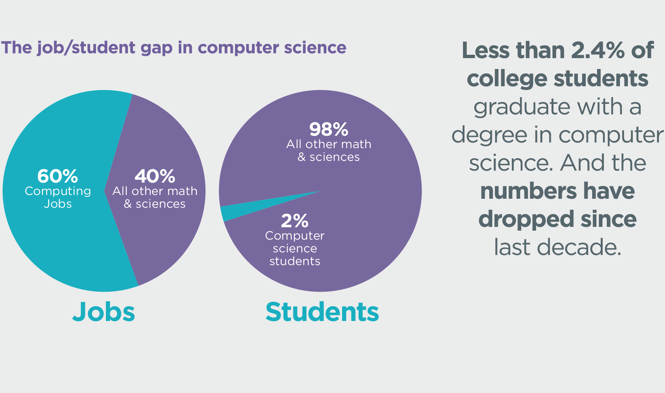
Programming is awesome! source: code.org
Today, I’d like to explain why investing in a computer science tutor for your son/daughter (or yourself!) may be the best decision you make in 2015. Learning computer science and programming is a fun, engaging, and worthwhile thing for anybody to do at a young age. But for those who aren’t familiar with computer science, it can seem hard to know where to start. As a computer science tutor here are two questions that I’m asked most often by curious parents: (a) “What’s the point of computer science for kids?”, and (b) “What’s the best way to start?”
Here are some answers to both of those questions:
Question (a): Why start learning computer science?
Answer #1: Computer science is fun! And so rewarding.
No doubt about it, learning computer science is a blast. To put it one way: learning computer science at a young age is like an incredibly creative art project that also simultaneously builds a “just do it!” attitude and nurtures mathematical intellect.
Answer #2: Programming skills will help you get things done, whoever you are.
It has become even increasingly more so in the past few years: my friends who are in medical school, law school, finance, biology — you name it — all say: “I wish I knew how to really program well…” And for good reason: being able to build significant software projects can drastically increase productivity in all of those fields and more. The fact of the matter is that software has heavily impacted almost every discipline of study.
Answer #3: Programming skills can be remarkably useful at a young age.
At any young age — middle school, high school, or college — being able to write code can be very useful. Somebody needs to build a website for the group project? “Jenny knows how to code, she can do it.” It’s also an easy way to make some easy cash at a young age. Want to have a fun summer project that could earn enough money to buy a nice bike, or maybe even a car? No matter how young, if you can write good software, you can get paid for it. Elon Musk sold his first piece of software at age 12.
Answer #4: Programming skills can also lead to rewarding, well-paying careers once your kids are old enough to have real jobs.
No doubt as well, that for somebody with the ability to sit down and choose any career, computer science makes a strong argument for itself being the most logical choice. The jobs are rewarding, plentiful, and pay very well. The median salary for an MIT computer science grad in 2014 was $100,000, first year out of college. (You can find that number buried deep in this report.. Also of interest are these other reports, to compare computer science with other disciplinesand)
Question (b): What’s the best way to start learning computer science?
Answer #5: Unfortunately, not usually school systems – they are still behind the wave.
Although some middle schools, high schools, and colleges are beginning to be better at teaching computer science in fun and engaging ways, most schools still do not supply strong learning environments for young students. Even if they do the best they can, the nature of learning computer science is that students learn much better by developing trusting relationships with tutors or peers, rather than sitting in classrooms where the teacher must teach to the “middle student”.
Answer #6: The apprenticeship model — the best way to learn!
The best way to learn how to program is via an apprenticeship model — similar to the best way to learn a musical instrument: lots of independent practice, and regular sessions with a knowledgeable expert. Sitting passively and listening doesn’t help too much. “Learn by doing” is always best! And just spending a small amount of time with someone much more experienced will accelerate learning development rapidly. (If I had to put a number on it, I would guess that a computer science tutor will accelerate learning by a factor of 10+ for when a student is just starting out.)
Answer #7: Where can I find a great computer science tutor?
Cambridge Coaching has some fantastic tutors with experience teaching computer science for kids. I myself am a PhD student at MIT in Computer Science, and I tutor because I love to work with students who want to get a head start. I’d be happy to start with you or the student in your family!
If you have any more questions about how to start investing in the computer science education of someone in your family, please feel free to reach out to us at Cambridge Coaching.
For more relevant reading, check out these other blog posts, written by tutors in NYC, Boston, and online computer science tutors: Lessons from 3 Great Mathematicians’ Lives, 3 Tips to Help You Make Sense of Advanced Math, and How Doing Math Problems Is Like Bashing Watermelons.

Comments